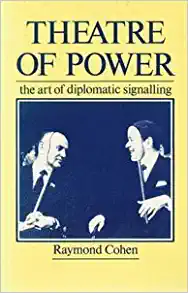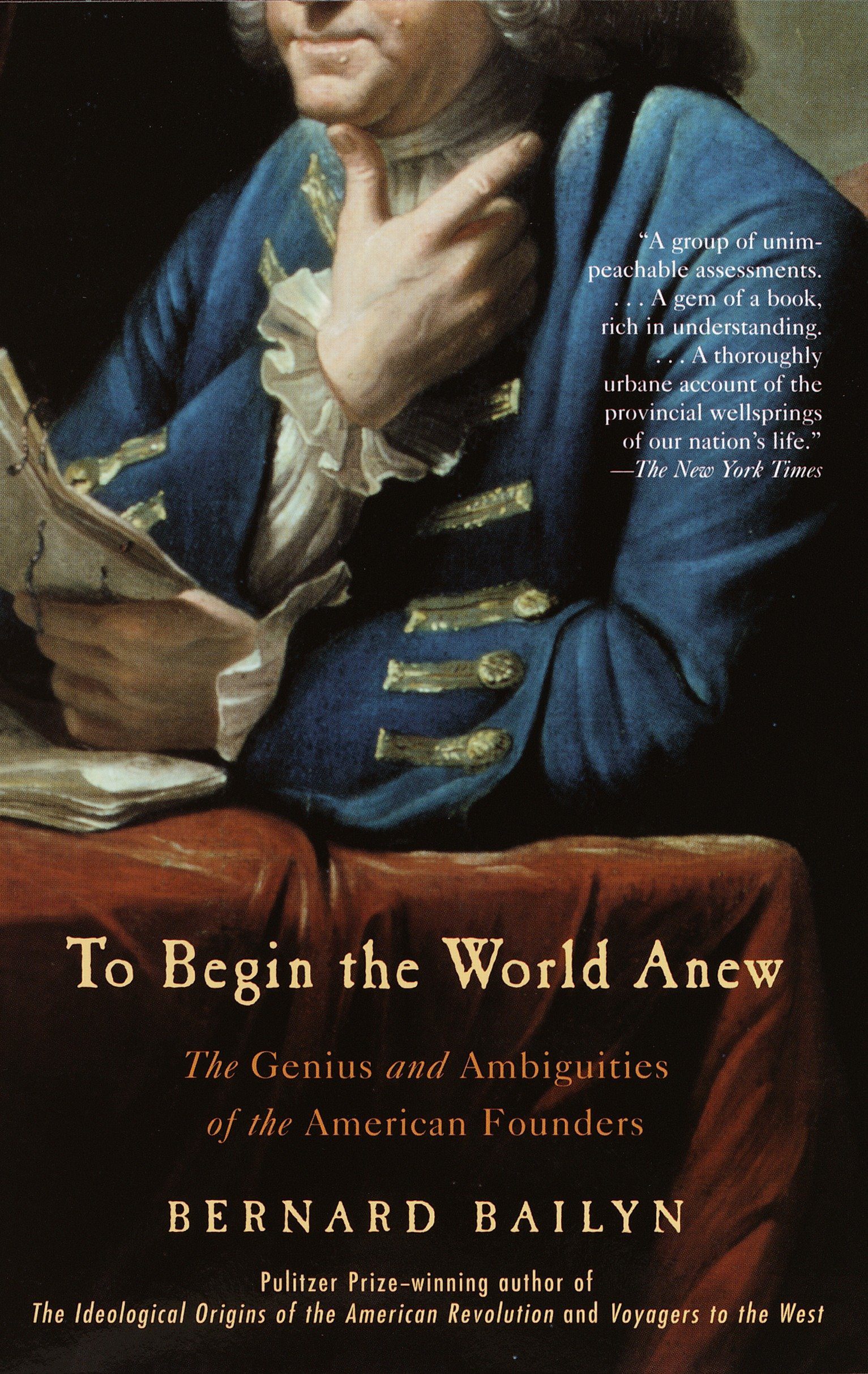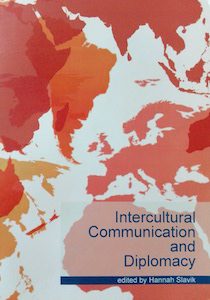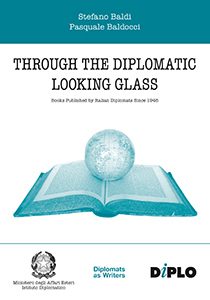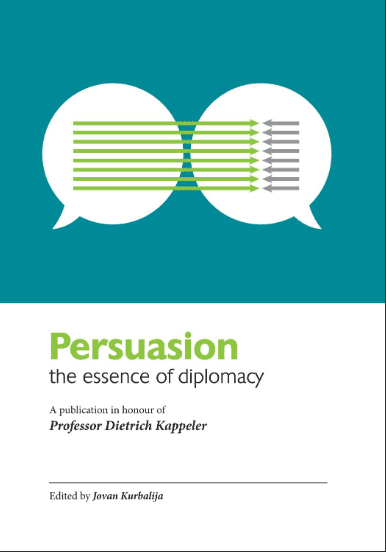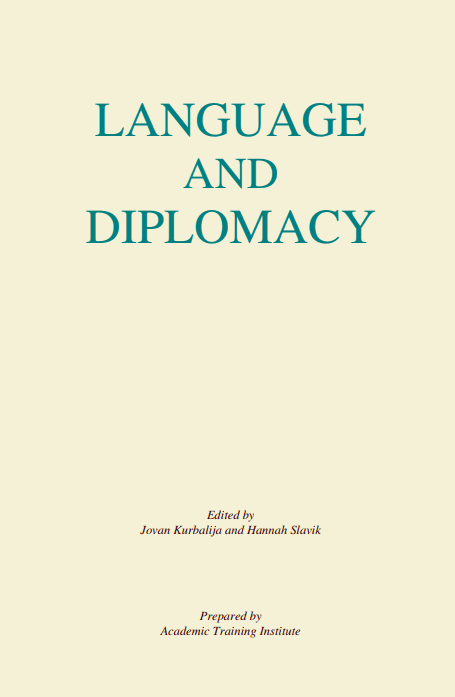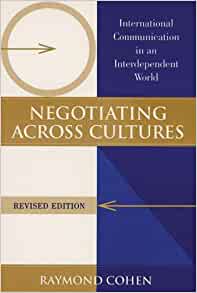However, “for the diplomatic profession…how to talk to Americans is a much larger shared problem than how the Americans talk to everybody else.” Sharp points out that many of the problems other nations encounter when dealing with Americans are not cultural at all, but common problems any nation faces when dealing with a richer and more powerful nation. As advice, he suggests the same rules that are given to American diplomats for dealing with others: show respect for other cultures and make necessary adjustments to avoid offence.
TALKING TO AMERICANS: THE GENERAL PROBLEM
In her speech at the Chiefs of Diplomatic Missions Ball two weeks ago today, the now-former US Secretary of State, Madeleine Albright made the following remarks to her assembled colleagues from other services:
Our purpose here this evening is truly just to relax and enjoy the company of this truly diverse group that has worked together so very, very, well. Because gathered here are the representatives of the entire family of humankind. We are all of different colors and races and creeds and backgrounds, and in our lives we have all traveled very different roads. But we share a certain basic understanding.2 (My italics)
Perhaps so, but the premise of this conference is that a “basic understanding” is not easily accessible through the medium of language for, in Raymond Cohen’s words, “…every language conveys a unique representation of the world.”3 The ways in which we speak and think are deeply rooted in our particular cultures, themselves the results of long processes of production and reproduction which evolve only slowly if, indeed, they evolve at all.
This is scarcely a novel observation. Indeed, the separateness of cultures has been historically presented as a raison d’être for diplomacy as a cosmopolitan caste of privileged professionals. They served their Princes and Peace, not only by pursuing interests, but also by keeping affairs of state properly insulated from passions, morals, and cultural peculiarities of those whom they were increasingly forced to represent, the peoples of their respective countries. A shared diplomatic culture distinguished by a common language and acquired by similar patterns of socialisation, it was argued by writers on diplomacy from de Callières and de Wiquefort to Satow and Nicolson, was the key to preserving this insulation.
However, the historical record of classical diplomacy provides grounds for treating these writers’ confidence in this regard with scepticism. Either the diplomats of 1914 did not share a common understanding of what was happening, or they were unable to get their respective leaders to accept that understanding. Clearly, the professionals were not as good at finessing the culture problem as their defenders thought they were simply because they could not. As libraries of philological, philosophical, and sociological inquiry in the twentieth century made clear, a direct correspondence between language and the material reality it purported to describe could not be taken for granted. The lingua franca of the day, be it Latin, French or English, was steeped in its own peculiarities of understanding and ways of seeing the world, and even professionals who acquired fluency in it did so with their habits of thought and understanding firmly structured by their own cultures mediated by their own languages.
If one adds to this the great irony of globalisation as far as diplomacy is concerned, namely that it is bringing together more and more people steeped in their own cultures and languages (politicians, business people, advocates and lobbyists for public transnational causes, and individuals),4 one begins to sense the scale of the contemporary problems posed to diplomacy by questions of language and culture. The contribution to international affairs by professional cosmopolitans who were probably never as effective at finessing culture as we had hoped, is being diluted by the onset of an army of hyphenated (for example, field, track two, and citizen), and even more culture-bound, small “d” diplomats.5
If the problem posed by language and culture for contemporary diplomacy is large, what are the dimensions of it which practitioners and scholars alike must address? I identify three: the central question; the operational dimension; and the political dimension.
- The Central Question: The central question which must occur to anyone once they are told that their way of apprehending the world and expressing themselves about it through language is shaped by culture is, how much? At one end of the continuum we can identify a simple correspondence theory, namely that we all pretty much see the same thing but have different but equivalent words for it (and anyone who says otherwise is mucking about). At the other end, we see claims that, for all practical purposes, in social life at least there is no objective “out there”, only subjective renditions which may or may not correspond with one another. Much diversity scholarship, for example, emphasises how racial, ethnic, class, gender and sexual (but rarely national) identities give rise to different ways of seeing the world. Any unity of vision between them can only be achieved by a process of oppression in which the views of subordinate identities are silenced by dominant ones. A better alternative is the creation and maintenance of much more limited and less ambitious areas of inter-subjective agreement by a process of ongoing negotiation (I hope that strikes a chord) between agents whose way of seeing the world differs not only from each other’s but also by whatever context they happen to be in.
- The Operational Dimension: Most diplomats and students of diplomacy necessarily find themselves adopting an intermediary position on this continuum. Experience soon teaches that a simple correspondence theory of language works no better for diplomats than it does for husbands and wives, parents and children or indeed human beings in any sort of relationship of some depth or complexity. Nevertheless, faith (or so it must seem at times) leads them to believe that some shared understanding is, in principle, always attainable for if it were not, there would be no point in having diplomats trying to find what it was. This being so, the operational dimension is concerned with how to proceed when one is conscious that the way in which one speaks to others and they speak to you is culturally-inscribed with meanings and significance which are not shared and, indeed, of which one may be unaware. There are few more dangerous situations in diplomacy than negotiations where the participants believe themselves to be in agreement with one another when, in fact, they are not. How, then, are such situations to be avoided?
- The Political Dimension: The answer to this question is complicated by the fact that diplomacy is not only a means of communication but also an instrument of policy and, as such, has a political dimension to it. Official pronouncements and protestations notwithstanding, there are circumstances in which states still strive for advantage vis à vis one another, and diplomats have a moral and professional obligation to their masters and those whom they represent in this regard. Certainly another key element of the moral ethos of professional diplomats is that they should strive to ensure that their own activities and communications do not become a source of unwanted tension and conflict between those they represent. When conflict is judged acceptable, however, and advantage is actively sought, then language and terminology become instruments in the contest. If setting the agenda and framing the questions for a negotiation can become vital matters for negotiation in themselves, then there is no reason to suppose that diplomats conscious of the differences between languages and the significance applied to key ideas within them will not seek advantage from this knowledge. A diplomat may not insist that his or her own conception of what it means, for example, to negotiate, make concessions, or work for peace is adopted as the sole measure of what these terms suggest, but will at least resist the adoption of the other fellows’ conception if it is not to his or her advantage.
TALKING TO AMERICANS: TWO PARTICULAR PROBLEMS
Applying the observations above to the question of dealing with the Americans raises two problems which are related to one another. The first is that most of the literature on diplomacy, language and culture is written as advice for how Americans and, to a lesser extent, other Westerners should deal with foreigners, principally non-Westerners. This is unfortunate because for the diplomatic profession, as opposed to the academic profession, how to talk to Americans is a much larger shared problem than how the Americans talk to everybody else.
It is also unfortunate in that the emphasis of the literature on the Americans structures the problem of language and diplomacy in a particular way. The Western way of thinking and speaking, we are reminded, is only a way of thinking and speaking, not the only way of thinking and speaking. Whatever its intrinsic merits or, indeed, its universal merits, in diplomacy, the fact that it is only one among several ways of so doing is more important. By implication, this warning contains an injunction to Western negotiators not only to be aware of these differences, but to adjust their own approach accordingly. If face and honour are important to the fellow with whom you are talking then this is a factor which must receive serious consideration if success is to be achieved.
This is sound advice, certainly, and there are plausible arguments for why the burden of cultural accommodation should be put on Western and principally American diplomats, rather than their non-Western counterparts. There is, of course, considerable, although incomplete, overlap between these two categories and two others, the rich, powerful and hegemonic, in aspiration at least, on the one hand, and the poor, weak, and more tolerant of diversity, in presentation at least, on the other. It may be claimed, therefore, that the weak and poor have already made, willy nilly, vast cultural concessions (after all, living in a sovereign state system may be plausibly claimed to be living under someone else’s arrangements for the majority of the world), or argued that from those to whom much has been given much is expected. The rich and powerful not only have the ability to accommodate others, they also have the moral obligation to do so.
However, the argument about where the responsibility to adjust and accommodate resides also rests on the claim that Western countries in general, and the United States in particular, stand in great need of cultural and linguistic sensitising. This, in its turn, is part of a more general argument to the effect that, the fact that it is the richest and most powerful country in the world notwithstanding, the United States does not actually handle itself very well or helpfully in day-to-day negotiations.
A recent conference of scholars and diplomats on “How the United States Negotiates,” for example, reached a number of conclusions along these lines.6 Among them were: the sense that the US plays the role of hegemon, acting dictatorially at times, and negotiating on the principle “…what’s mine is mine. What’s yours is negotiable”; the perception of “…an intrusive United States” arising from increased salience of economic, human rights and governance issues in international affairs; concerns about “…US unilateralism and indifference to local circumstances and the domestic requirements of other countries”; and worries about the extent to which the US is internally constrained by its constitutional arrangements and electoral cycles, resulting in certain issues being manipulated for domestic gain “…without much consideration of the international context or impact” and American negotiators using domestic circumstances as “a convenient excuse” for not co-operating with others or to impose their own timetable on negotiations.7
These are important observations to be sure. However, I would argue that none of them are particular to the United States and none of them are manifestations of a particular culture. Rather, they are manifestations of the distribution of power and wealth in the world.8 Specifically, they capture the experience of dealing with someone who is richer and more powerful than oneself, an experience which reoccurs in multiple settings on a daily basis in diplomacy. I would venture that there is more than a family resemblance between the experience of the Canadians dealing with Washington, the Jamaicans dealing with Ottawa and our own hosts talking to Rome.
I appear to be on the brink of disavowing the importance of language and culture to diplomacy at this point. I am not. The point I wish to make before proceeding is just how difficult it is to separate culture and language from other causal factors in diplomacy. The conference noted above was part of an ongoing project on cross-cultural negotiation, yet its findings, as reported, about how Americans negotiate addressed factors whose relationship to American culture and language were indistinct while their relationship to other factors, more easily identified, was clear. However, wealth and power, and the behaviour they engender in those who possess them (not to mention the reactions they may engender in those who do not) are not, in themselves, manifestations of culture. In making an assessment of the importance of culture as mediated by language to the conduct of diplomacy, it is necessary to begin, at least, by treating them separately from wealth and power.
TALKING TO AMERICANS: THE FRAMEWORK
A useful starting point is the continuum which Cohen offers for making an analysis of negotiating styles in terms of the importance which negotiators attach to the broad cultural context in which they see themselves operating, this importance itself being a manifestation of culture of which the bearers may or may not be aware.9 For these purposes, he suggests that cultures can be arranged along a continuum from high context to low context. Thus, the culture of the Middle East is presented in high context terms. Arab diplomats are said, by Cohen, to attach great importance to context in several dimensions. They bring to any negotiation a strong and particular sense of the history which has brought the participants together, and it is important that this general sense informs the contributions of all parties to the negotiation. They also operate with a sharp distinction between the way in which they believe matters of state ought to be considered between princes and matters of commerce be negotiated between traders. The former is the realm of principle and justice in which the participants should seek to achieve what is right, and an unwillingness to approach matters of state in this manner is seen as a serious obstacle to any real progress. The latter is the realm of the market where goods may be haggled over and where no great moral principles are at stake. Finally, Arab diplomats attach a great importance to the development of a thick interpersonal context between negotiators in which personal friendship and trust may be established and in which, above all, a concern for the personal honour and dignity of each participant may be affirmed.
In Cohen’s analysis, Arab diplomats and Middle Eastern societies are presented to illustrate a particular type, but also to serve as a clear example of what may be regarded as traditional societies or, at least, developing societies within which the traditional element remains strong. Although great differences can exist between and within such societies which are manifested in linguistic confusions and pitfalls, what we are offered, at least as a starting point, is a global bifurcation between the more-or-less developing world in which traditional values give rise to a high context negotiating culture, and the more-or-less developed world in which context and the problem at hand are more likely to merge.
If Arab diplomacy archetypically demonstrates the negotiating style born of a high context culture, then American diplomacy, in Cohen’s view, serves as a powerful example of the negotiating style to which the low context cultures of the developed world give rise. American diplomats regard diplomacy as an exercise in collective problem-solving. Problem-solving can be of two sorts: technical, arrived at by the application of knowledge and expertise to achieve a solution consistent with the interests of the parties involved; or political, involving give-and-take in accordance with some rough-and-ready conception of fairness modified by the balance of power, commitment, and perceptions of both. Establishing the fundamental principles of an environmental or trade treaty would serve as an example of the first kind of negotiation. Working out the terms upon which individual countries might become parties to the broad agreement would be an example of the second type. Critical to low context negotiating cultures is the subordination of history, personal honour, an ongoing relationship, and just about everything else, to the achievement of an agreement, or at least an outcome, for the matter in hand. The problem is the thing, all else is clutter and undergrowth to be cleared away by the diplomatic equivalent of Lockean philosophers, at least it is such to all people of goodwill who seriously want to accomplish something in a negotiation.
Cohen’s point is that very serious misunderstandings can arise for cultural and linguistic reasons. They do not give rise to conflict where otherwise there would have been none so much as exacerbate conflicts of interest and make them harder to resolve. Language differences can give rise to difficulties even between diplomats from similar backgrounds on the high context/low context continuum, but between diplomats from cultures which are wide apart, fundamental differences can occur regarding not only what is at stake, but also about what it means to conduct a diplomatic negotiation.
Thus, it is argued, negotiations between Americans and others can run into trouble because the Americans appear too direct both in their use of language and in their whole approach to what is at stake. In so doing, they offend the sensibilities of their negotiating partners before even getting to the real business. The most famous, but flawed, example of this might be Tariq Aziz’s rejection of the message brought by James Baker from President Bush for Saddam Hussein just before the Gulf War, rejected because of its undiplomatic language. Americans, in contrast become frustrated by what they see as evasiveness and stalling which results, in their view, from their counterparts, in Satow’s term, “…having to contend for a bad cause”.10
Useful though Cohen’s distinction between high context and low context cultures is as a point of departure, overly relied upon it leads to trouble. It does so in two ways. First, by oversimplifying, it misses the extent to which there exist variations within cultures which are themselves brought forth by different contexts. I lack the expertise to speak for high context societies, but I can speak with some experience of US culture(s), and I can say there are times and circumstances in which US negotiations are very high context, even on the proverbial second hand car lot. In Minnesota alone books have been written (and, more importantly, money has been made) providing outsiders with the context they need to make sense of what is, or may be, being communicated in the sparse conversations and non-verbal exchanges which participants in the culture instantly recognise.
In everyday life at least, Americans sometimes negotiate in a low context manner and sometimes they do not. The question to be asked is what kind of contexts give rise to which kinds of approaches to negotiating, and I have already suggested that an analysis of the balance of resources between those involved might be a starting point for an answer to this question. Syrians in their dealings with Americans and Israelis may take a high context approach, but Syrians in their dealings with the Lebanese or the Kurds, one suspects, may take a low context approach.
The second problem with the high context-low context approach resides in its characterisation of what is meant by low context. While Cohen and others are at pains to suggest that the low-context, American approach involves only one way of looking at the world which is not necessarily superior to others, they do tend to accept it on its own terms, namely that it is sparse or thin not only in its presentation but also in fact. By so doing, an opportunity is missed to put the use of language by Americans under the microscope. A closer examination reveals, of course, an implied universe of assumptions about what is important, how the world works, and America’s proper place within it, not to mention the place of others.
Consider again Albright’s remarks at the Chiefs of Missions Ball. We all share, she claimed, “…a basic understanding”.11 An earlier commentator, de Callières, made a similar sounding remark when he suggested that diplomacy could be viewed as a freemasonry united by the common need to know what was going on. However, Albright’s conception of “…the common understanding” was far more extensive. “Diplomacy”, she maintained, “…is about building and nourishing partnerships for cooperative action towards common goals” and foreign policy (which, incidentally, she called “…the best subject in the world”) is “…the way people work to reach peace”.
While her speech provided plenty of evidence to support the collaborative problem-solving problematic suggested by Cohen and others, however, what receives very little acknowledgment in it is the idea that others have their own conceptions about the nature of the problems needing solutions and, indeed, that others have interests. Insofar as these are recognised, Albright identifies them as “our goals” which need explaining and “…each other’s needs” which require understanding if we are all to work together successfully.
The significance of these remarks is given a context in other speeches she made during her final round of the Washington and national circuits. In her farewell address at the State Department, for example, she concluded by saying:
Our country, like any, is composed of humans and therefore flawed. We are not always right in our actions and our judgements, but I know from the experience of my own life the importance and rightness of America’s ideals.12
Two days before, in a speech to the Chicago Council on Foreign Relations in which she explicitly rejected seeing US foreign policy in terms of a debate between “…Wilsonian idealists and geo-political realists”, she provided her own formula for the seamless relationship between ideals and self-interest in US foreign policy under the Clinton administration. The administration had, she claimed, been “…determined to do the right thing in a pragmatic way”.13
One has to be careful in the way one selects and uses this kind of text. The professionals among us, and those who study what they say, will be quick to recognise the formulaic quality of the selections above and sense the way in which they are generated by the demands of the occasion. In the Chicago speech, for example, Albright began by saying that for her final trip as Secretary of State:
…it is no accident that I didn’t choose to go to the capital of a foreign country, but rather to the capital of America’s heartland.
She also provided a different definition of diplomacy or, at least, American diplomacy. “The job of our diplomats…” she maintained “…is to protect and advance the interests of our citizens.”14 In the immediate context she was flattering her audience and boosting the State Department with a hard nose sell to those sceptics who believe that its job is to represent the interests of foreigners in Washington and at unnecessary expense.
And yet, when coupled with my own experience of working with Americans, there is something more implied by what Albright chooses, or has chosen for her, to say on such occasions and the way in which it is expressed. First, I would maintain, there is a confident grasp on what life is all about, and by this I do not just mean a strong sense of American identity. It is a grasp of what life, in general, for everybody is, or ought to be, about. I wish I could say that this was just a presentational requirement for elite membership and advancement, but it is not. It seems to be manifested at all levels of society, if not uniformly among all races and ethnic groups. Nor is this a phenomenon associated with one end of the political spectrum. Members of the right and left or, more accurately, conservatives and liberals, all tend to manifest this confidence about their own conception of America as an embodiment of the way in which real people everywhere, if only free of the burden of lazy state bureaucrats or cranky neo-Marxian intellectuals would really like to live.
Secondly, this confident grasp of life in general has a place for those who simply do not conform to its requirements. Paradoxically, for a society which is founded upon an 18th century philosophy preserved in aspic, as it were, which took interests very seriously, it has little tolerance not so much for those who are different, but for those who will not “play ball”. Demonisation is a term which has perhaps been over-used, but this is effectively what can happen to those who are uncooperative. They must be wicked or, at least, led by the wicked.
Some of the targets of this process of demonisation in recent years have certainly deserved it, but I think what makes this indulgence so difficult for others to accept is its selective character. “Their” sons-of-bitches or, these days, free standing sons-of-bitches get the full treatment whereas “our” sons-of-bitches barely figure as such on the radar screens. And of course, the whole concept of demonisation, fairly or selectively employed, is a nightmare for effective diplomacy which is premised in great part on the need to talk with those for whom we do not feel responsible, may not trust, or do not like, but with whom we must, nevertheless, have relations.
How then do we talk to such people? I will conclude with some brief talking points. Sometimes, there can be no talking to them at all. Sometimes they are rich enough and strong enough to have their way. Nearly always, they are rich enough and strong enough to go home if they do not like what is happening, with losses to everybody but asymmetrically distributed. However, more often than not, and for bad reasons as well as good ones (consider Clinton’s recent efforts on the Middle East peace process, like a cardiologist applying the paddles when everyone else in the room, including the patient, is telling him he’s dead for now) they want to talk.
On the big question of the relationship between language and the “out there” which is variously posited not to exist, to be constructed by language, or accessed by it directly, I would suggest showing respect for American claims to a privileged access. Respect here can mean several things. As a Briton who has lived in the US for fifteen years and before that was congenitally disposed against even visiting the place, let alone living there, I am happy to concede that, as civilizational models go, they, the Americans, have got a lot of things right and, more importantly, they have got a lot of things right in the judgement of many less privileged than ourselves around the world. Respect can also mean simply taking them seriously in their claims. Americans are frequently presented as gauche, naive, incapable of irony (watch the Simpsons) or ambiguity and understatement (watch Frazier), that they somehow don’t get what life is really all about for those who are fully human. These are, in my judgement, mistakes. Taking Americans seriously, however, can also mean simply acknowledging their power and wealth (those of you who saw Jurassic Park may remember the expert’s mini lesson to the bored and unimpressed child about how ‘raptors hunt and kill, which culminates in his dragging the claw across the boy’s belly and enjoining him to “…show a little respect”).
On the operational question of how diplomats should deal with the problem of language and culture once they become aware of it, the advice is the same as that given by the literature to Americans about how to deal with foreigners. Make adjustments to avoid unnecessary offence (Americans have a highly peculiar habit of resenting what they see as the importation of irrelevant data or arguments into a negotiation; a tale of five hundred years of oppression may win you a fifth down, they may even spot you three points, but a touch down remains a touch down, especially after they have scored it) and make such adjustments where mutual or unilateral gains are possible as a result (I was recently engaged in a negotiation with a British university where everybody was incredibly uncomfortable talking about money, including their money man, to the point that the negotiation possibly failed prematurely). Stepping out of one’s own culture to deal with foreigners is no dishonour, indeed I am sure it is ranked as one of the attributes of a successful diplomat.
Finally regarding the political dimension to language, culture and the practice of diplomacy, it is reasonably easy to imagine a number of techniques for exploiting the particularities of culture of which we are all, to a point prisoners. On this matter, however, I will take my cue from the professionals among us, acknowledge that diplomacy is, indeed, a political business, smile, and fall silent.
ENDNOTES
1. My title echoes Monteagle Stearne’s Talking With Strangers: Improving American Foreign Policy at Home and Abroad (Princeton, 1999).
2. Madeleine Albright, Remarks at Chief of Diplomatic Missions Ball, January 13, 2001, State Department website, https://www.state.gov/index.cfm.
3. Raymond Cohen, “Negotiating Across Languages,” paper prepared for the British International Studies Annual Conference, Bradford, December, 2000, 1.
4. Raymond Cohen, “International Negotiations: A Semantic Analysis,” Columbia Online, https://wwwc.cc.columbia.edu/sec/dlc/ciao/isa/cor01/ February 1999.
5. To distinguish between big, or capital, “D” Diplomats and small “d” diplomats appears to be one way of finessing another problem, whether the term may be used for the representatives of anything other than sovereign states and the international organisations created by them.
6. “How the United States Negotiates,” conference organised by the United States Institute of Peace (USIP), 24-26 July, 2000, reported in Peace Watch, VI, 6, October 2000.
7. Ibid., 2-3.
8. Note, however, that none of the characteristics observed are a manifestation of different interests, at least not directly. Wealth and power may be isolated from culture up to a point, but interests take their shape from, and may even be rooted in culture.
9. Raymond Cohen, Negotiating Across Cultures: International Communication in an Interdependent World, revised ed. (Washington DC: USIP Press, 1997), 25-43.
10. Satow’s phrase about the essentially tragic circumstances in which even the very best diplomats, both in moral and practical terms, may find themselves.
11. Albright, Remarks.
12. Farewell Address to the State Department, January 19, 2001.
13. Address to the Chicago Council on Foreign Relations, January 17, 2001.
14. Ibid.


